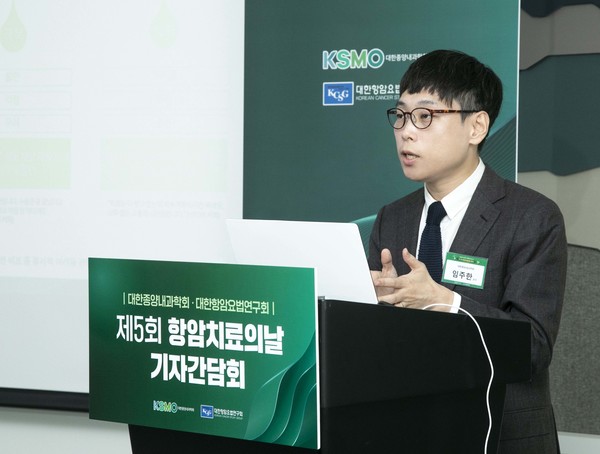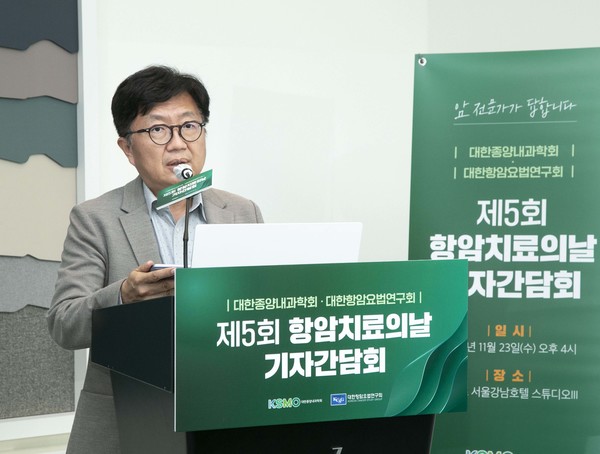Only 44 percent of cancer patients learned cancer-related information from health experts, a study showed.
The Korean Society of Medical Oncology (KSMO) and the Korean Cancer Study Group held a press conference to celebrate the fifth Anticancer Treatment Day at Andaz Seoul Gangnam Hotel on Wednesday and announced the results of analyzing social listening data.
KSMO has designated the fourth Wednesday of November every year as "Anti-Cancer Treatment Day" and has been holding related events to help people understand chemotherapy properly.
Social listening refers to activities that quickly and extensively detect the raw information mentioned by social media users. The information helps experts or the government respond appropriately regarding the subject and design appropriate messages in advance and disseminate them through appropriate channels.
According to the two societies, they collected and analyzed 169,575 mentions of three keywords -- cancer, cancer treatment, and patient management -- on online social media platforms, including Naver, Daum, and YouTube, for the past year.
Out of 1,661 cases of cancer patients' mentioning where they receive cancer-related information, only 44 percent of patients received cancer-related information from doctors, followed by other patients (24 percent), online communities (18 percent), and YouTube (14 percent).

"In most cases, information was obtained from experts with specialized knowledge," said Lim Joo-han, a professor of hemato-oncology at Inha University Hospital, said. "However, there were many cases in which patients received practical information and psychological comfort from other patients."
Notably, there was no case where information was obtained through official cancer websites, such as the National Cancer Information Center, Lim added.
Lim stressed that related academic societies need to work harder to publicize such official channels.
The study also highlighted the difficulties experienced by cancer patients in the course of treatment after diagnosis.
After analyzing 20,899 cases of mentioning difficulties experienced by cancer patients, the study found that physical and disease difficulties accounted for the most cases, with 52 percent, followed closely by emotional difficulties at 42 percent.
"Emotional difficulties appeared in different aspects throughout the treatment process from the beginning, but in common, emotions such as fear and anxiety were constantly mentioned," Lim said. "Concerns about recurrence and fear of death in case of exacerbation were also mentioned in the overcoming phase after treatment."
Contrary to the importance of emotional difficulties, Lim stressed there was little mention of emotional management to resolve them.
"Only 9 percent of 16,743 comments related to patient management mentioned emotional management to resolve such difficulties," Lim said.
Especially, Lim explained that the rate of actively managing emotional difficulties through professional help, such as psychiatric counseling and taking antidepressants, was very low.
"Emotional difficulties have been found not only in cancer patients but also in cancer survivors," Lim said. "The emotional difficulties of patients who are at a crossroads between life and death are very well recognized in the clinical field, and are a part that needs to be carefully cared for in the future."
As patients' mental health affects the actual treatment effect, emotional care needs to be emphasized from a multidisciplinary perspective such as psychiatry, Lim added.
To this end, other doctors participating in the press conference suggested that the payment system for psychiatric treatment for cancer patients should be improved and a change in the social consensus toward receiving psychiatric treatment.
"Korean patients have reluctance toward psychiatry treatment, and this reluctance often results in refusal of receiving psychiatric help," Professor Heo Seok-jae of the Department of Oncology at Dong-A University Hospital said. "Also, most university hospitals do not have a realistic system to treat cancer patients actively."
Along with improving awareness of psychiatric care, the system should be improved so that medical institutions can also receive multidisciplinary care, Heo added.
Professor Kim In-ho of the Department of Oncology at Seoul St. Mary's Hospital agreed.
"The reality is that institutional policies to resolve the emotional difficulties of cancer patients are lacking," Kim said. "As there are limitations to solving such problems in the clinical field, it is necessary to prepare emotional management or psychological care support policies for cancer patients at the governmental and social level, such as improving the psychological care payment system for cancer patients."

Meanwhile, KSMO chairman Ahn Joong-bae stressed the significance of the study.
"There is a lot of information on cancer treatment on the internet, but it is difficult to filter them accurately, making it difficult to receive proper treatment," Ahn said. "Therefore, it was meaningful to get a glimpse of actual patients' perceptions and concerns."

